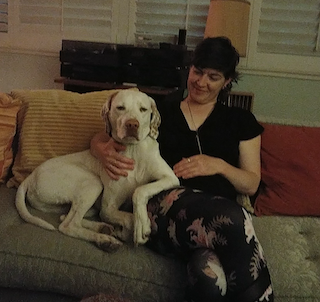Melina Packer
Chancellor’s Postdoctoral Fellow in Gender & Sexuality Studies (2020-2022)
Faculty Mentor: Jade Sasser
 Top three texts I would take to a desert island: The God of Small Things by Arundhati Roy, The Poisonwood Bible by Barbara Kingsolver, Mating by Norman Rush
Top three texts I would take to a desert island: The God of Small Things by Arundhati Roy, The Poisonwood Bible by Barbara Kingsolver, Mating by Norman Rush
Favorite Activity: Hiking with my dog
Something people might be amazed to know about me: I am deathly afraid of swimming.
A ‘famous’ scholar I would love to meet: Michelle Murphy
Theme song: “I Want to Break Free” – Queen
URL to share: melinapacker.com
Q: Your research agenda summed up in one sentence:
I am interested in how sexual and racial ideologies seep into modern science, and how these embedded biases affect broader applications of scientific knowledge.

Pepper the dog sitting with Melina on the couch, looking superior as always. (Photo credit: B. Nahid.)
Q: Six words that describe your work:
queer feminist science studies, critical race theory, political ecology
Q: How would you characterize the contribution you are making to your field of study?
Like other work in critical feminist science studies, my research emphasizes that science is neither neutral nor objective, and that being more honest about the inextricable politics of science will produce better, more justice-centered scientific research and applications.
Q: What are working on currently?
My current project is a critical feminist analysis of US toxicology. My archival and ethnographic research shows that founding toxicologists were aligned with chemical manufacturer interests (military and industrial). I argue that these early allegiances help explain why toxicants remain so ubiquitous, poorly regulated, and unevenly distributed today.
Q: What led you to this topic in particular?
What started me on this research path/topic was a hunch that the “evil corporations” vs. “pure scientists” explanation (for why harmful toxicants are so pervasive) was not telling the whole story, particularly in terms of the imperial ideologies haunting synthetic chemical production and deployment.
Q: Do you have a favorite book you like to recommend?
Imperial Leather: Race, Gender, and Sexuality in the Colonial Contest, by Anne McClintock, because this book so clearly and powerfully demonstrates the physical/material and psychological/spiritual reverberations of “the implacable rage of male paranoia,” as she phrases it.
Q: What do you find rewarding about the process of research?
I am repeatedly blown away by the generosity and thoughtfulness expressed by the people I interview for my research. I learn so much from my interviewees, and love hearing their stories.
***
In Focus is a interview series that features faculty associates of the Center for Ideas and Society.
